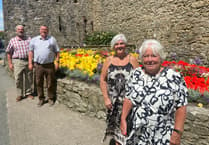A time extension for previous plans to convert a former nightclub on the outskirts of Tenby into a nursing home, against a backdrop of an increasing older population in the county, has been backed by Pembrokeshire planners.
Back in 2018, Pembrokeshire County Council planners approved a scheme to turn the former DJs nightclub – also once known as the Night Owl – in the village of Penally, which sits alongside Tenby, into a 31-bedroom nursing home with treatment rooms, dining room, sitting room, kitchen, reception, recreation area, laundry and pharmacy.
At the time, the Local Authority’s planning committee agreed there was a “need” for such a facility and it would provide a “planning gain.”
Tenby county councillor for the seaside town’s North ward, Cllr Michael Williams said at that meeting: “This building has been empty for many years and is becoming an eyesore, this is a welcome development.”
The nursing home approval replaced a 2016 plan for 11 dwellings on the site.
Since the scheme was approved, applicant Mr Zouras recently sought an additional three years to commence development.
Penally Community Council has raised no objections to the application, but its members said consideration should be given to the length of time the building has been empty, also raising an ongoing issue of there being no current footpath alongside the road in front of the property.
An officer report recommending approval said the only condition change was an increased timescale, but the application was considered “afresh”.
It stated: “Within the original planning application an Age UK report was submitted to support the application. The report provided population projections for 2015–2036 which suggested a significant increase in the population over 65 years of age.
“Pembrokeshire Demographic Forecasts (July 2018) projected an increase in the over 65 age group by 7,688 (32 per cent increase) between 2017 and 2033.
The report added: “An increase in the elderly population in the county, coupled with the decline in health associated with ageing populations, will lead to an increased need for residential care facilities.”
The application was conditionally approved under delegated powers.




